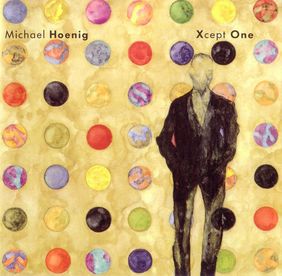 |  | |||||||||||||||||||||
Michael Hoenig Xcept One- Studio, released 1987 - | |||||||||||||||||||||||||
Cover |
| ||||||||||||||||||||||||
Tracks |
| ||||||||||||||||||||||||
Details |
| ||||||||||||||||||||||||
Notes | Nine years after his first solo album, Michael Hoenig released Xcept One, his last solo effort to date, leaving aside the numerous soundtrack scores he recorded, of which only very few have been released in album format. | ||||||||||||||||||||||||
In an interview with Christopher Lawless and Michael Darnell, Michael Hoenig remembers about Xcept One: "I was approached by some people who wanted to form a label called Cinema Records. They liked my earlier work, and had already signed Patrick Moraz and Pete Bardens, and were extremely passionate about an all-instrumental label. Their zealousness soon convinced me that it was the right thing to do next. The unfortunate aspect of the episode emerged by the time the label's first six albums were released. The entire staff responsible for the label at Capitol Records -- who had been so enthusiastic about the project -- somehow all got fired in a corporate reshuffle. I recall finding myself in a meeting with a publicity executive who said, 'Well, I somehow like your music, but I can't understand it. If you could at least wear some leather outfits and chains I would know how to market you, but without that, what exactly is it that you're doing?' I was in total disbelief about what I had heard -- it was like a comic strip that was happening live and direct right in front of me. It all ended right there, and it was simply too depressing to even deal with." (Beyond the Horizon Vol. 4 No. 3, Summer 1996) | |||||||||||||||||||||||||
On Xcept One he again worked with American ambient/avant-garde composer Harold Budd: Hoenig had co-produced Budd's most recent album Lovely Thunder in 1986, and in return Budd now co-composed the title Spectral Gong with Michael Hoenig and played Synclavier on that track. | |||||||||||||||||||||||||
Brad Ellis, American composer and jazz pianist co-composed the track Bones On The Beach together with Hoenig. This track might be the best known composition from this album, as (according to Wikipedia) it was installed in the roller coaster 'Chaos' at the now defunct Opryland Themepark in Nashville (Tennessee, USA), making the attraction the first roller coaster to be synced to music. Since 2004 the composition is used in a similar roller coaster in the Bobbejaanland family park (Belgium). | |||||||||||||||||||||||||
The title track, Xcept One, was entirely composed by Michael Hoenig, but arranged by Hoenig, Ellis and Steve Hammond. | |||||||||||||||||||||||||
According to the CD booklet, the musicians used the following equipment:
| |||||||||||||||||||||||||
Releases |
| ||||||||||||||||||||||||
Copyright/Disclaimer © 2001-2025 by Michael Berling. Last Update: 2025-01-03 17:20 |

